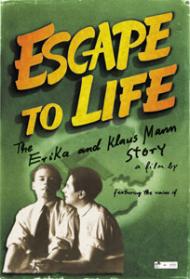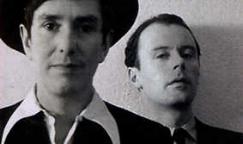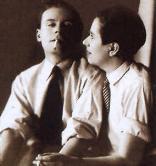
Escape to life: The Erika and Klaus Mann story
(Back) to my home page
(Back) to my main film page
(Back) to my International Film festival Rotterdam page
Director: Wieland Speck and Andrea Weiss
Writer: Wieland Speck and Andrea Weiss
Country: Germany
Year: 2000
Duration: 85 minutes
Cast:
- Cora Frost :
- Christoph Eichhorn : Klaus Mann
- Maren Kroymann :
- Jean Loup :
- Guido Kleineidam :
- Corin Redgrave / Ulrich Mattes : Klaus Mann (Narrator / Verteller)
- Vanessa Redgrave / Barbara Nüsse : Erika Mann (Narrator / Verteller)
 Story: This dramatised documentary is a portrait of Erika Mann and Klaus Mann, the two openly gay oldest children of German writer Thomas Mann (Death in Venice) and follows them from childhood through adulthood in the mid-1900s. They both were writers, antifascists, and cabaret performers and were nearly inseparable, having such a close bond that they often told people they were twins. When Hitler took power, Erika and Klaus moved to the United States where they continued to write. During this time, Erika began to do most of her antifascist work, which eventually took her to England. Klaus started a literary journal, which featured the writings of his father and other illustrious intellectuals of the time. But Klaus's battle with drug abuse was a losing one and he spent many years disillusioned and depressed. In his forties, he committed suicide.
Story: This dramatised documentary is a portrait of Erika Mann and Klaus Mann, the two openly gay oldest children of German writer Thomas Mann (Death in Venice) and follows them from childhood through adulthood in the mid-1900s. They both were writers, antifascists, and cabaret performers and were nearly inseparable, having such a close bond that they often told people they were twins. When Hitler took power, Erika and Klaus moved to the United States where they continued to write. During this time, Erika began to do most of her antifascist work, which eventually took her to England. Klaus started a literary journal, which featured the writings of his father and other illustrious intellectuals of the time. But Klaus's battle with drug abuse was a losing one and he spent many years disillusioned and depressed. In his forties, he committed suicide.
 Verhaal: Deze gedramatiseerde documentaire is een portret van Erika Mann en Klaus Mann, de twee openlijk homoseksuele kinderen van de Duitse schrijver Thomas Mann (Death in Venice) en volgt hen van hun kindertijd naar volwassenheid in het midden van de 20e eeuw. Ze waren beide schrijver, antifascisten en cabaretier en waren bijna onafscheidelijk, en hadden zo'n innige band met elkaar dat ze vaak aan mensen vertelden dat ze een tweeling waren. Toen Hitler aan de macht kwam, verhuisden Erika en Klaus naar de Verenigde Staten waar ze hun schrijfwerk voortzetten. Gedurende deze tijd begon Erika het grootste deel van haar anti-fascistische werk te doen, wat haar naar Engeland bracht. Klaus begon een literair tijdschrift, dat de pennevruchten van zijn vader bevatte en van andere illustere intellectuelen uit die tijd. Maar Klaus' strijd tegen zijn drugsverslaving was een verloren strijd en hij was jarenlang gedesillusioneerd en depressief. Na zijn veertigste pleegde hij zelfmoord.
Verhaal: Deze gedramatiseerde documentaire is een portret van Erika Mann en Klaus Mann, de twee openlijk homoseksuele kinderen van de Duitse schrijver Thomas Mann (Death in Venice) en volgt hen van hun kindertijd naar volwassenheid in het midden van de 20e eeuw. Ze waren beide schrijver, antifascisten en cabaretier en waren bijna onafscheidelijk, en hadden zo'n innige band met elkaar dat ze vaak aan mensen vertelden dat ze een tweeling waren. Toen Hitler aan de macht kwam, verhuisden Erika en Klaus naar de Verenigde Staten waar ze hun schrijfwerk voortzetten. Gedurende deze tijd begon Erika het grootste deel van haar anti-fascistische werk te doen, wat haar naar Engeland bracht. Klaus begon een literair tijdschrift, dat de pennevruchten van zijn vader bevatte en van andere illustere intellectuelen uit die tijd. Maar Klaus' strijd tegen zijn drugsverslaving was een verloren strijd en hij was jarenlang gedesillusioneerd en depressief. Na zijn veertigste pleegde hij zelfmoord.






 Story: This dramatised documentary is a portrait of Erika Mann and Klaus Mann, the two openly gay oldest children of German writer Thomas Mann (Death in Venice) and follows them from childhood through adulthood in the mid-1900s. They both were writers, antifascists, and cabaret performers and were nearly inseparable, having such a close bond that they often told people they were twins. When Hitler took power, Erika and Klaus moved to the United States where they continued to write. During this time, Erika began to do most of her antifascist work, which eventually took her to England. Klaus started a literary journal, which featured the writings of his father and other illustrious intellectuals of the time. But Klaus's battle with drug abuse was a losing one and he spent many years disillusioned and depressed. In his forties, he committed suicide.
Story: This dramatised documentary is a portrait of Erika Mann and Klaus Mann, the two openly gay oldest children of German writer Thomas Mann (Death in Venice) and follows them from childhood through adulthood in the mid-1900s. They both were writers, antifascists, and cabaret performers and were nearly inseparable, having such a close bond that they often told people they were twins. When Hitler took power, Erika and Klaus moved to the United States where they continued to write. During this time, Erika began to do most of her antifascist work, which eventually took her to England. Klaus started a literary journal, which featured the writings of his father and other illustrious intellectuals of the time. But Klaus's battle with drug abuse was a losing one and he spent many years disillusioned and depressed. In his forties, he committed suicide.
 Verhaal: Deze gedramatiseerde documentaire is een portret van Erika Mann en Klaus Mann, de twee openlijk homoseksuele kinderen van de Duitse schrijver Thomas Mann (Death in Venice) en volgt hen van hun kindertijd naar volwassenheid in het midden van de 20e eeuw. Ze waren beide schrijver, antifascisten en cabaretier en waren bijna onafscheidelijk, en hadden zo'n innige band met elkaar dat ze vaak aan mensen vertelden dat ze een tweeling waren. Toen Hitler aan de macht kwam, verhuisden Erika en Klaus naar de Verenigde Staten waar ze hun schrijfwerk voortzetten. Gedurende deze tijd begon Erika het grootste deel van haar anti-fascistische werk te doen, wat haar naar Engeland bracht. Klaus begon een literair tijdschrift, dat de pennevruchten van zijn vader bevatte en van andere illustere intellectuelen uit die tijd. Maar Klaus' strijd tegen zijn drugsverslaving was een verloren strijd en hij was jarenlang gedesillusioneerd en depressief. Na zijn veertigste pleegde hij zelfmoord.
Verhaal: Deze gedramatiseerde documentaire is een portret van Erika Mann en Klaus Mann, de twee openlijk homoseksuele kinderen van de Duitse schrijver Thomas Mann (Death in Venice) en volgt hen van hun kindertijd naar volwassenheid in het midden van de 20e eeuw. Ze waren beide schrijver, antifascisten en cabaretier en waren bijna onafscheidelijk, en hadden zo'n innige band met elkaar dat ze vaak aan mensen vertelden dat ze een tweeling waren. Toen Hitler aan de macht kwam, verhuisden Erika en Klaus naar de Verenigde Staten waar ze hun schrijfwerk voortzetten. Gedurende deze tijd begon Erika het grootste deel van haar anti-fascistische werk te doen, wat haar naar Engeland bracht. Klaus begon een literair tijdschrift, dat de pennevruchten van zijn vader bevatte en van andere illustere intellectuelen uit die tijd. Maar Klaus' strijd tegen zijn drugsverslaving was een verloren strijd en hij was jarenlang gedesillusioneerd en depressief. Na zijn veertigste pleegde hij zelfmoord.



